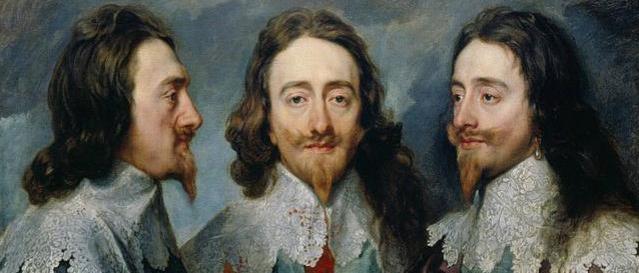Eikon Basilike
Posted on 30th April 2021
The Portraiture of His Sacred Majestie in his Solitudes and Sufferings, better known to us as the Eikon Basilike, is a book containing the meditations and prayers of King Charles I written in the style of a diary in the months immediately preceding his execution.
Said to have been written by the King himself, but more likely compiled from among his papers by Dr John Gauden the future Bishop of Exeter, it presents a strong defence of His Majesty and of Royal policy during the Civil War.
Published with the approval of parliament (a decision they would very soon regret) just ten days after the King’s execution on 9 February 1649, the Eikon was a reassertion of royal authority and purity of motive tinged with regret only for the death of the Earl of Strafford, a sin for which he was justly martyred on the altar of defeat and usurpation.
The Eikon’s frontispiece similarly emphasised the King’s martyrdom displaying a monarch in direct communication with God reminding everyone of his divine appointment.

Such was the impact of the Eikon that in the autumn of 1649 parliament commissioned John Milton to pen a refutation of its main tenets. A committed republican though he was Milton was disinclined to engage in polemics and only agreed to do so under pressure from his close friend Oliver Cromwell. His Eikonoklastes, or image breaker, published the following year was not a success however, for despite selling well among those supporters of the new Commonwealth its hectoring style which condemned the people for their stupidity and slavish devotion to a false God – an inconstant, irrational, and image doting rabble.
He had already vilified the King as a demagogue and those ‘gentlemen’ he professed to so admire as the ragged infantry of stewes and brothels. Now he went further declaring the people “a credulous and hapless herd, begotten to servility. And enchanted with these popular institutes of tyranny,” It was not the way to influence people, win friends, and change minds. And he didn’t do so.
Milton’s attempt to dismantle the King’s argument line by line and page by page and dismiss the King’s book as frivolous, self-justifying poetry was undermined by the confession that his own was propaganda, but no amount of spin could change the minds of a people who after ten years of war and famine hankered after the
more stable past they readily associated with a now dead King,
Despite the best efforts of parliament to disparage the late King’s memory his Eikon Basilike much like his last words spoken upon the scaffold to a hushed crowd of thousands would help pave the way to his son’s return and the restoration of the Stuart Monarchy.
Tagged as: Tudor & Stuart
Share this post:





